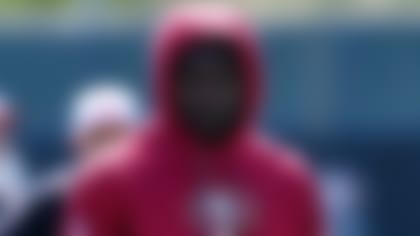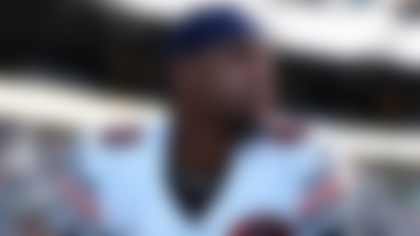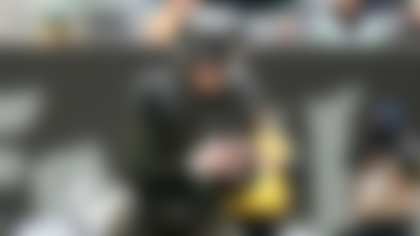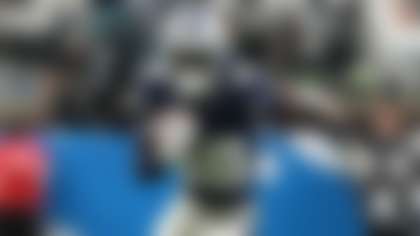The Great Tush Push Debate will live on for at least another couple of months.
The Green Bay Packers' proposal to ban the modified quarterback sneak -- a play famously and successfully utilized by the Philadelphia Eagles in recent seasons -- has been tabled until a later date.
The matter was a topic of much discussion over the past two days at the Annual League Meeting in Palm Beach, Florida, with Tuesday's competition committee gathering setting the stage for a showdown over the future of the play. Proponents and opponents of outlawing the play spoke publicly about it during the first two days of meetings, but ultimately, the league's decision-makers are choosing to give everyone more time to consider all circumstances.
"The discussion on the tush push was very good, we showed a lot of data, a lot of questions from the clubs, a lot of discussion about it," NFL Commissioner Roger Goodell told reporters during a Tuesday news conference at the conclusion of the league meeting.
"I think there are safety issues that are being considered in that case. We have very little data from it, but it's beyond data, there's also the mechanism of injury that we study, that type of thing that leads us to show the risk involved with a particular play or a particular tackle. So those are things that we did discuss."
Opponents have cast the play as a danger to player safety, while supporters of preserving the play have pointed to a lack of data backing these claims. During the meetings, the NFL's medical experts emphasized to clubs that there is potential injury risk, even without substantial data to prove it at this time, per Pelissero.
NFL Competition Committee chairman Rich McKay explained during a Tuesday interview on NFL Network that player health and safety was part of the conversation surrounding the play, but it was not the only factor ownership considered.
"There were discussions of, 'Hey, this just doesn't feel like traditional play. This isn't what football was invented to be. This feels a little more rugby. We're worried about health and safety,'" McKay said.
McKay also told reporters that discussions Tuesday on the tush push lasted about 30-40 minutes, and referenced previous language in the rule book regarding pushing players that was removed in 2004.
"Up to 2004, we had rules in place that prohibited pushing and pulling, and we deleted that from the book because it became harder for our officials to officiate downfield what was going on," McKay said. "So that got deleted. From that came a play like this and a formation like this. So I think the idea was, listen, as opposed to voting on this particular proposal today, Green Bay asked could we go back and talk about reintroducing the 2004 language, study it, understand it, and talk about it again when we get to May."
Goodell reiterated the need to examine the pre-2004 language on pushing and pulling players when examining the tush push.
"I do think there's a lot of discussion about going back to the previous rule, back to pre-2004," Goodell said. "There's a dispute about how long that rule was in play. But the reality of it is that I think that makes a lot of sense in many ways, because I think it expands it beyond just that single play. There are a lot of plays where you see someone pulling or pushing someone that are not in the tush push formation that I think do have an increased risk of injury. So I think the committee will look at that and come back in May with some proposals."
A ban on the tush push would seemingly affect the Eagles the most, and Philadelphia owner Jeffrey Lurie discussed the proposal on Tuesday when meeting with reporters in Florida, while casting his doubts on the play's injury risk.
"I think for everybody including myself, especially, health and safety is the most important thing when evaluating any play," Lurie said. "We've been very open to whatever data exists on the tush push. There's just been no data that shows that it isn't a very, very safe play. If it weren't, we wouldn't be pushing the tush push.
"There's an ebb and flow, and I don't ever remember a play being banned because a single team or a few teams were running it effectively. So, it's part of what I think most of us love about football is it's a chess match. Let the chess match play out. If for any reason it does get banned, we will try to be the best at short-yardage situations. We've got a lot of ideas there, but I think it's a credit to using our personnel in a way – there aren't' many teams that have 600-pound squatting quarterbacks and that offensive line. If there were any injury concern, I would be concerned."
Goodell, however, rejected the notion that a potential ban of the play was related to a specific team.
"We're not looking at this as the context of one team, what we're looking at is a particular play that may have an increased potential for injuries," Goodell said. "As I said before, one of the things we're looking at is the rule we had prior to 2004 that didn't allow a lot of that pull or push anywhere on the field. And some of those hits happen outside of a tush push. And that's one of the things we want the committee to go back and look at with our health and safety team, to sort of look at those incidents and see should our rule be broader than just a tush push? And that's something they're going to bring back to the membership in May."
The Spring League Meeting runs May 20-21 in Minneapolis.












